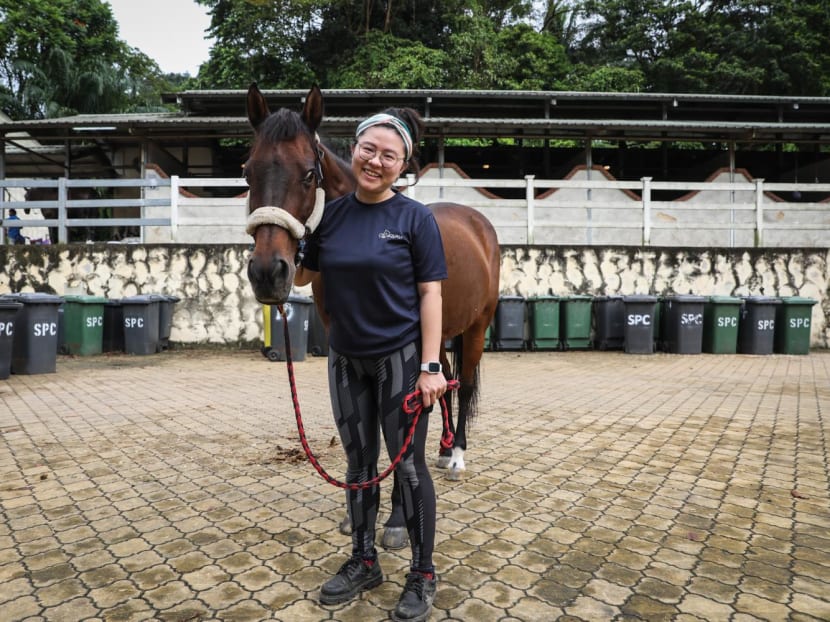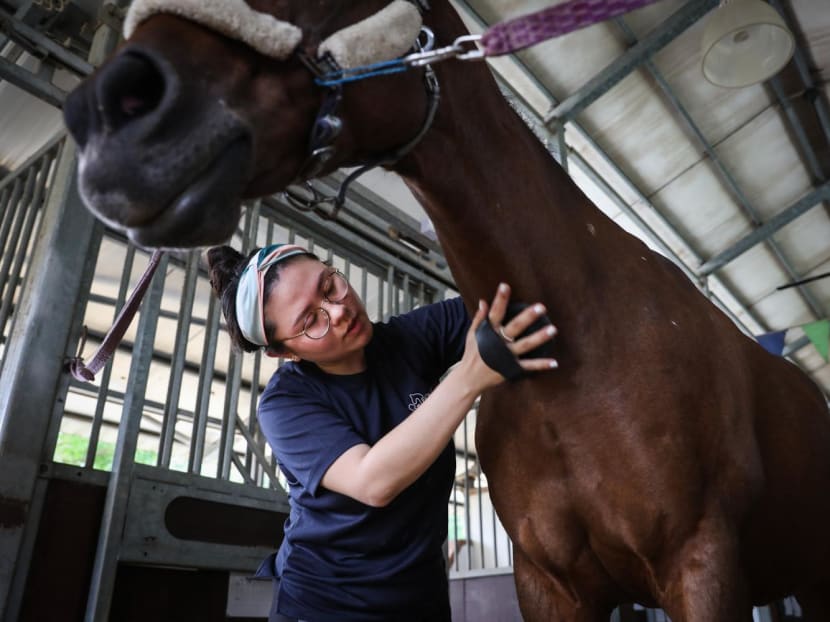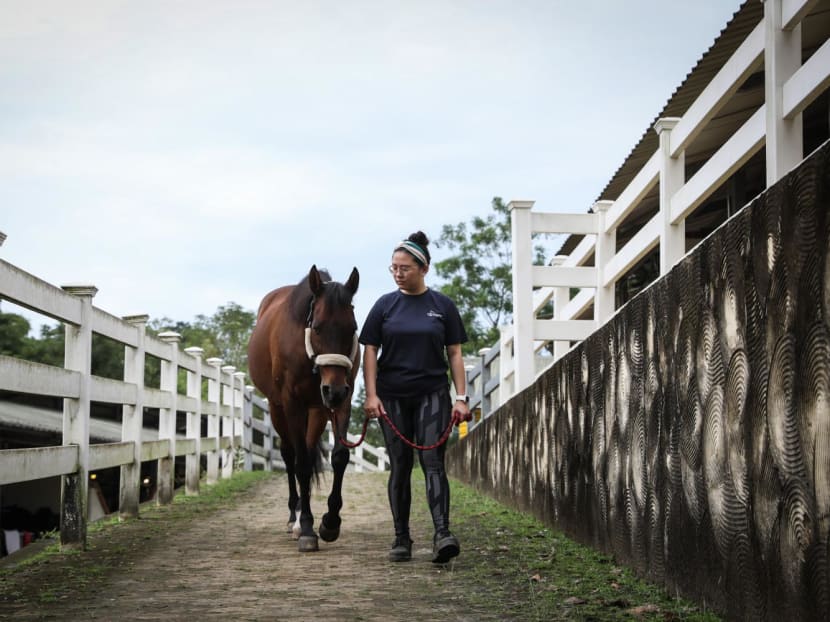Gen Y Speaks: How my Covid-19 quarantine with a stranger led to a handful of horse poop and a dollop of life lessons
Contracting Covid-19 and being quarantined with a stranger in a hotel room turned out to be one of the best things that happened to me during this pandemic.

Ms Veron Ng, who works in the hospitality sector, believes that experiencing fear can also mean moving out of her comfort zone and heading towards growth.
Contracting Covid-19 and being quarantined with a stranger in a hotel room turned out to be one of the best things that happened to me during this pandemic.
I caught the bug a couple of weeks after I returned from a trip to Thailand in March 2022, and was issued an isolation order at the time.
When I opted to isolate myself in a government facility, a Health Ministry officer told me there was a possibility that I could be sharing the room with others, given the surge in cases and the strict rules at the time.
So, for several days, I was confined in a 16 sqm room in a four-star hotel with a complete stranger.
It turned out to be an unexpectedly pleasant “staycation”, one that led to deep conversations about self-discovery that helped me find the drive that I had been looking for.
A SEARCH FOR MEANING
My roommate is a Malaysian accountant of a similar age to me.
You see, I’m not fazed by the idea of striking conversations with strangers.
Prior to the pandemic, I was an avid solo backpacker and often found it rewarding to befriend locals and other backpackers along the way.
For years, I kept to a rotation of school, part-time work and travel – a concoction of activities that I figured out over time could give me a mix of personal development, self-discovery and adventure.
But to a large degree, Covid-19 grounded that routine. This quarantine after my Thai trip was another reminder that the life that I knew has changed.
As I shared these about myself with my roommate, we began conversing about the various types of sports we have tried and those we are keen to explore.
“How about horse-riding?”, she suggested.
My eyes lit up, surprised at my roommate’s suggestion.
The more we chatted about her equestrian idea, the more it appealed to my desire for novelty and thrill.
I liked the idea of participating in a sport with such a large, majestic animal, which can be frightening. But I believe that experiencing fear also means moving out of my comfort zone, and that could lead to growth.
SEEKING OUT THE STABLE
Piqued by my roommate’s recommendation, I quickly did an online search during our conversation as the idea strongly appealed to me.
At the same time, the issue of cost was on my mind. Getting into horse-riding would require an investment, especially when I was still unsure about whether I would like the experience.
Unwilling to put off the idea, I relied on my backpacker’s thinking to find a more economical alternative.

The main bulk of the cost would be the lessons. A 45 minutes trial class on a weekend with helmet and boots rental cost me S$120.
The cheapest riding package I could find is S$800 for 10 classes that are 45 minutes each, and excludes the rental of helmet and boots. I got low-cost gear from Decathlon as well.
Then, I sought out Equal, an animal-assisted learning centre which aims to develop life skills in youths, people with special needs, families and the elderly.
This organisation also houses retired race and polo horses, giving them a second career as “therapy horses”.
I called the centre to offer my services as a volunteer on weekends. After some back-and-forth communication, including many questions about my motivations for volunteering and the caveat that I will need to be comfortable working with horses, I started my role there in April this year.
WHAT PICKING HORSE POOP TAUGHT ME
When I first started, I was attached to another experienced volunteer to learn how to muck out the stables and distribute the horses’ lunch.
She showed me how to clean the stables and take care of these magnificent creatures, and once I got comfortable with the horses, I was able to do things independently, and try out other tasks such as walking the horse, grooming, and cleaning their stables.
It is some ways off from my original idea of horse-riding, but this horse poop-picking experience is no less thrilling. At the same time, volunteering allowed me to be exposed to horses first before investing deeper into the sport.
For the six months that I’ve been doing this, I’ve learnt not only how to care for horses but also picked up several golden lessons from the volunteer to help me navigate through my working life.
The first advice is to not go around looking for poop, but to let it come to me and then deal with it.
Instead of digging through the bedding for horse poop, I learnt to sift up the hay and allow the manure to show itself.

Similarly, when it comes to problem-solving, going straight towards the problem may not be the most effective way.
I now use this advice in my life, such as when I have to deal with interpersonal conflict. Instead of trying to resolve the problem immediately, I found it more fruitful to ask for some space and revisit these differences later.
When emotions are running high, it can be challenging to see others’ views. Sometimes, having clarity can allow the discovery of more objective views.
The second lesson I learnt is no matter how much I clean the stables, there will always be poop to be found.
This is why it is important to know when to stop when you have tried your best.
Once, I kept finding broken pieces of dried manure even after an intensive cleaning. I went on a “treasure hunt” to find the rest of the poop, but it meant that I did not get as much time grooming or walking the horses as I would like.
Work is about trade-offs, so getting something to perfection means something else will have to give.
The third lesson that I took home with me is the importance of confidence when it came to leadership.
It is not easy to get a large and strong animal to listen to commands. While the success of each action can depend on the horse’s temperament, a handler who exudes confidence makes all the difference.
Walking a horse is an act of leadership, and if my body language shows that I am new to handling the horse, it will not want to follow me.
I’ve found that there are parallels when it comes to human leadership too. Whether it is a new project at work or a new role, believing in myself can change the outcome entirely.
AN ABUNDANCE MINDSET
The final lesson came from my entire experience of trying out something new as a volunteer in an animal-assisted learning centre. It is to have an abundance mindset – that I stand to gain too when I am willing to give.
By giving my time to the horses, I received more than I thought I would from the start.
Besides the exposure, I discovered an unexplored perspective of myself, learned to be more mindful of non-verbal communication and brushed up my confidence.
Instead of the common thinking “what’s in it for me” or “what will I lose”, I saw it as “what can I give and value-add to others”.
To me, change is the central theme of the pandemic and beyond. I saw the importance of adaptability and flexibility, and that being involved in personal development helps to better deal with change by getting out of the comfort zone.
Ultimately, I came to the conclusion that as much as it is easy to blame Covid-19 for the loss of opportunities, there is always a positive side and we are responsible for our own development.
After all, if you do not develop yourself, then who?
ABOUT THE AUTHOR:
Veron Ng works in the hospitality sector and conducts talks on solo travel for students and working adults.









